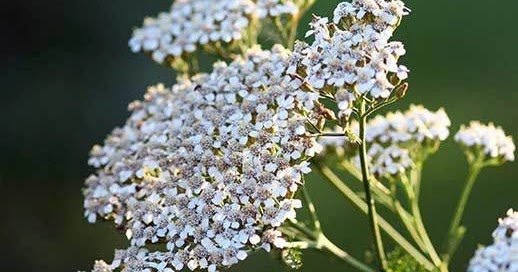Commonly known as achillea, yarrow, bloodwort, carpenter’s weed, devil’s nettle, nosebleed, old man’s pepper, staunch weed, thousand-leaf, and woundwort (among other names).
Achillea millefolium, commonly known as yarrow or common yarrow is a flowering plant in the family Asteraceae. It is native to temperate regions of the Northern Hemisphere in Asia, Europe, and North America. Wikipedia
Identify:
Flower heads are arranged in large, compact clusters at the top of the stem, each cluster consisting of 1 or more flower heads. The flower head has 20-25 yellowish-white (rarely pink) ray flowers and similarly colored disk flowers, divided into smaller leaflets, giving them a delicate, fernlike, lacy appearance.
Medical Uses:
Yarrow leaves have been used for tea, and young leaves and flowers have been used in salads. Infusions of yarrow have served as cosmetic cleansers and medicines.
Yarrow has been used to induce sweating and to stop wound bleeding. It also has been reported to reduce heavy menstrual bleeding and pain. It has been used to relieve GI ailments, for cerebral and coronary thromboses, to lower high blood pressure, to improve circulation, and to tone varicose veins.
It has antimicrobial actions, is a natural source for food flavoring, and is used in alcoholic beverages and bitters.
•Helps fight bacteria and viruses — Drinking a tea made from yarrow, elderflower, linden, boneset, peppermint, and ginger can promote sweating and help eradicate flu-causing viruses from your body.
•Promotes digestion and detoxification — Yarrow’s bitter components and fatty acids encourage proper bile secretion from the gallbladder, which can then improve digestion and keep gallstones from forming.
•Helps relieve cramps and menstrual pain — Yarrow can also help regulate menstrual periods, particularly controlling heavy flow.
•May be effective against skin conditions, such as eczema — Not only can it help stop wounds from bleeding, but it can be used as first aid for ulcers.
•Helps stop nosebleeds — Applying dried or powdered yarrow leaves inside nostrils may help stop the bleeding.
•Relieves pain from arthritis and rheumatism — It has anti-inflammatory properties that may alleviate pain brought on by these conditions.
•Helps relieve hemorrhoids — Drinking yarrow tea or tincture or placing a yarrow poultice or compress over the affected area may soothe this health problem.
In a 2017 study on achillea asiatica extract, researchers concluded that the herb was effective at improving skin wounds in rats through multiple effects at the cellular level.
A 2017 study out of Iran supports the use of achillea millefolium in neurodegenerative disease, including multiple sclerosis, Parkinson’s disease, stroke, and epilepsy. This conclusion is based on findings in animal studies.
The 2017 review and other studies support yarrow’s effectiveness for:
Immune-system support
Regulating blood sugar in diabetes
Protecting the liver and gallbladder: In combination with other herbs, yarrow is used for bloating, intestinal gas (flatulence), mild gastrointestinal (GI) cramping, and other GI complaints.
Stimulating menstruation: Yarrow is used for fever, common cold, hay fever, absence of menstruation, dysentery, diarrhea, loss of appetite, gastrointestinal (GI) tract discomfort, and to induce sweating.
Helping with sleep
Treating hemorrhoids / Yarrow is applied to the skin to stop bleeding from hemorrhoids; for wounds; and as a sitz bath for painful, lower pelvic, cramp-like conditions in women.
Alleviating hay fever: Yarrow is used for fever, common cold, hay fever, absence of menstruation, dysentery, diarrhea, loss of appetite, gastrointestinal (GI) tract discomfort, and to induce sweating.
Speeding elimination of urine
Anxiety: A 2015 review of the anti-anxiety properties of essential oils found that two varieties of yarrow—achillea umbellate and achillea wilhemsii—did appear to help lessen anxiety.
Tooth Pain: Some people chew the fresh leaves to relieve toothache.
Side Effects:
Drowsiness
Increased urination
Skin irritation when used topically (such as for wound healing)
Slowed Blood Clotting
Yarrow may make your skin more sensitive to sunlight. Pregnant women and breastfeeding mothers should also refrain from using yarrow, as this herb may induce a miscarriage and may have unknown effects on an unborn child.
www.betterherbnews.com


